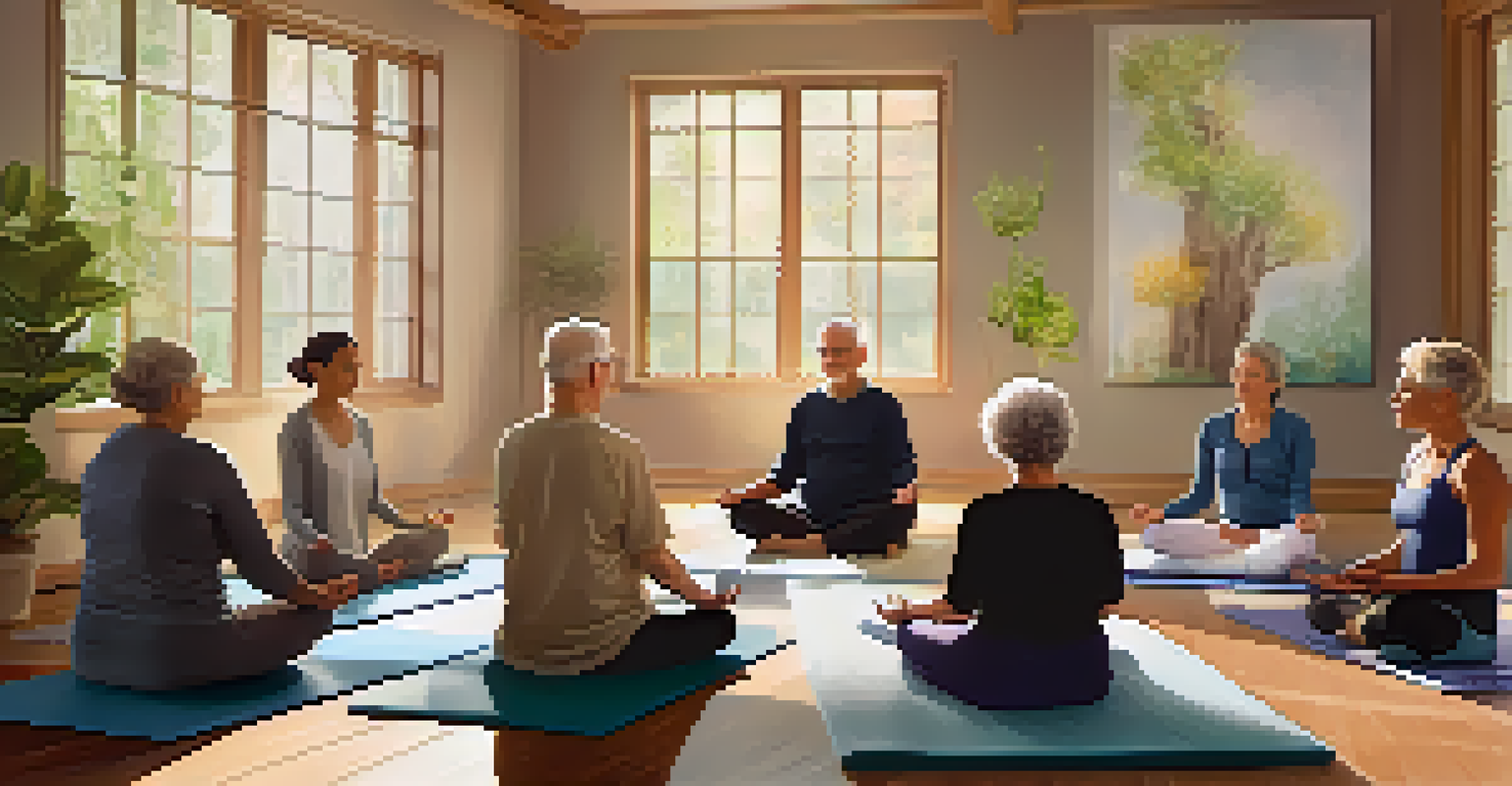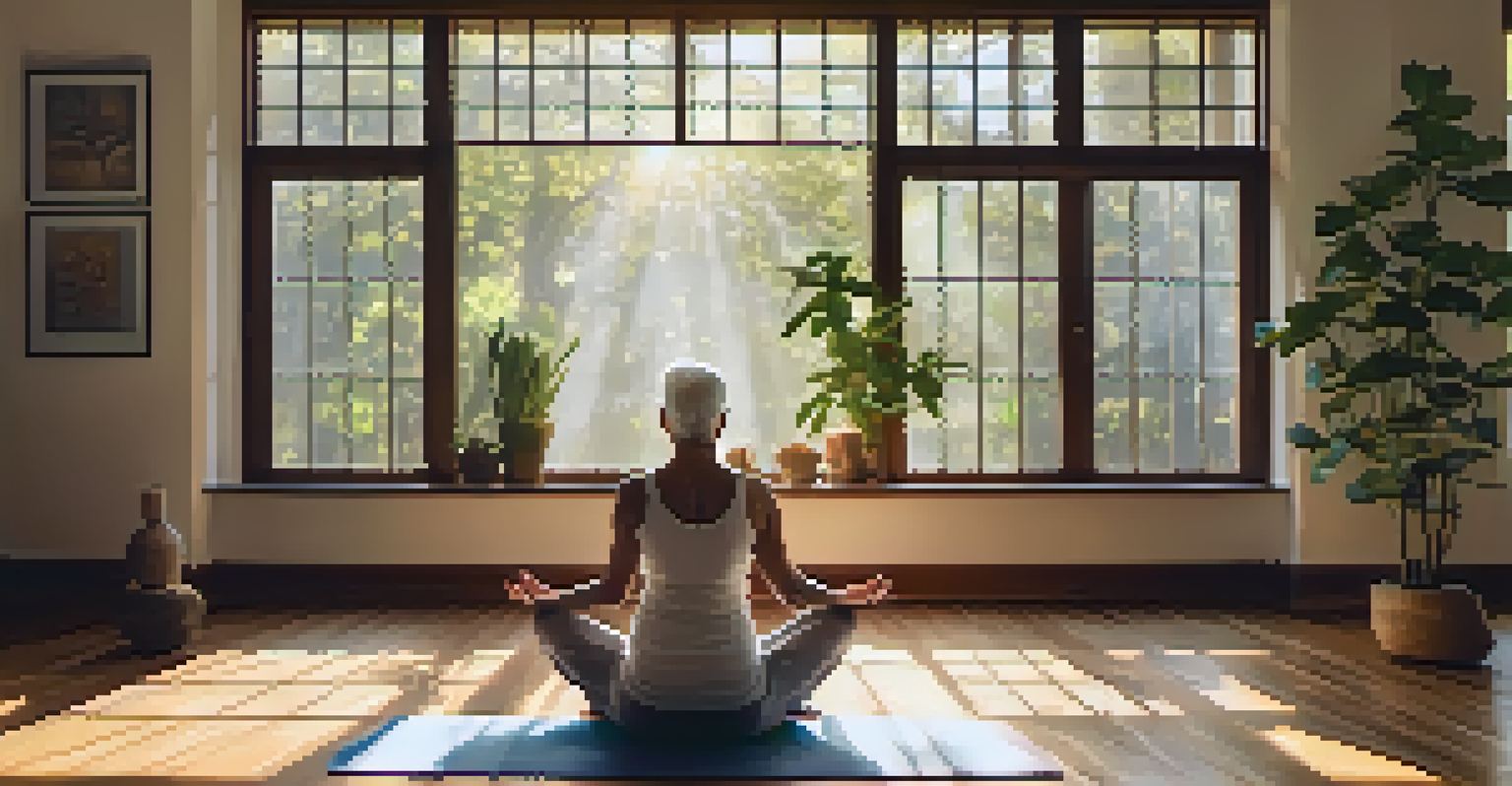The Role of Meditation in Promoting Healthy Aging

Understanding Healthy Aging: More Than Just Growing Older
Healthy aging encompasses not just the absence of disease but also maintaining mental, emotional, and physical well-being as we age. It’s about thriving, rather than just surviving. This holistic view encourages individuals to embrace a lifestyle that supports their overall quality of life.
The mind is everything. What you think, you become.
As we age, the body goes through various changes, and these can impact our health and happiness. Factors such as stress, cognitive decline, and physical limitations can create challenges. However, healthy aging promotes resilience and adaptability to these changes, allowing us to lead fulfilling lives.
Meditation emerges as a powerful tool in this journey, offering techniques to enhance mindfulness and emotional regulation. By integrating meditation into our daily lives, we can foster a proactive approach to healthy aging, ensuring we not only live longer but also live better.
The Science Behind Meditation and Aging
Research has shown that meditation can lead to significant changes in the brain, particularly in areas associated with memory, emotional regulation, and stress response. For example, studies reveal that regular meditators may experience increased gray matter density in regions linked to these functions. This is important as we age since cognitive health is a crucial aspect of overall well-being.

Moreover, meditation has been found to reduce the levels of stress hormones like cortisol. High cortisol levels can lead to various health issues, including heart disease and impaired cognitive function. By managing stress through meditation, we can potentially mitigate these risks and support a healthier aging process.
Healthy Aging Emphasizes Well-Being
Healthy aging includes not just physical health but also mental and emotional well-being, encouraging a lifestyle that enhances overall quality of life.
The benefits of meditation extend beyond the brain. It also enhances our immune system, promotes better sleep, and can even reduce chronic pain. All these factors play a vital role in how we experience aging, making meditation a valuable ally in promoting longevity and vitality.
Meditation Techniques for Older Adults
There are various forms of meditation, making it easy for individuals of all ages to find a method that resonates with them. Mindfulness meditation, which focuses on being present and aware, is particularly popular. This technique encourages individuals to observe their thoughts and feelings without judgment, creating a sense of calm and clarity.
Aging is not lost youth but a new stage of opportunity and strength.
Another effective method is guided meditation, where individuals listen to a recording or attend a class led by an instructor. This can be especially helpful for beginners who may feel unsure about how to meditate on their own. Many guided sessions are tailored specifically for older adults, addressing common concerns such as anxiety and sleep disturbances.
For those who prefer a more physical approach, yoga combines movement with meditation, enhancing flexibility and strength while promoting relaxation. Incorporating stretching and deep breathing can make meditation a more holistic practice, catering to both the mind and body.
The Emotional Benefits of Meditation in Aging
Meditation has a profound impact on emotional health, which is especially crucial as we age. Many older adults experience feelings of loneliness or depression due to lifestyle changes or loss of loved ones. Regular meditation practice can help cultivate a sense of connection, promoting emotional resilience and well-being.
By fostering self-awareness and acceptance, meditation allows individuals to navigate their emotions more effectively. This can lead to improved relationships with family and friends, as well as a greater appreciation for life. Feeling more in tune with our emotions can enhance our overall happiness and satisfaction.
Meditation Boosts Brain Health
Research shows that meditation can improve cognitive function and emotional regulation, making it a key practice for maintaining brain health as we age.
Additionally, meditation encourages gratitude, helping us focus on the positive aspects of our lives rather than dwelling on the negatives. This shift in perspective can be transformative, leading to a more fulfilling and joyful aging experience.
Meditation's Role in Physical Health as We Age
The physical health benefits of meditation are equally noteworthy. Regular practice can lower blood pressure, reduce inflammation, and improve heart health, all of which are critical as we grow older. By taking charge of our physical health through meditation, we can lower our risk of age-related diseases.
Moreover, meditation encourages healthier lifestyle choices. When we practice mindfulness, we become more attuned to our bodies and their needs. This awareness can lead to better nutrition, increased physical activity, and improved sleep patterns, all of which contribute to overall health.
For older adults, incorporating meditation into daily routines can also help in managing chronic pain. Techniques such as mindfulness-based pain management have shown promise in reducing the perception of pain, allowing individuals to engage more fully in their daily activities.
Building a Routine: How to Start Meditating
Starting a meditation practice doesn’t have to be overwhelming. The key is to begin with just a few minutes a day, gradually increasing the duration as you become more comfortable. Setting aside time in the morning or evening can help create a consistent routine that fits your lifestyle.
Finding a quiet, comfortable space is essential for effective meditation. Whether it’s a cozy corner of your home or a peaceful outdoor setting, having a designated space can help signal your brain that it’s time to relax and focus. Consider using cushions or chairs that support your posture, making it easier to stay engaged during your practice.
Community Supports Meditation Practice
Joining meditation groups fosters social connections, combating feelings of isolation and enriching the aging experience through shared purpose.
Additionally, utilizing apps or online resources can provide guidance and structure, making it easier to stay motivated. Many apps offer various types of meditations tailored for beginners, ensuring you find something that resonates with you. Remember, the most important part is to be patient with yourself and enjoy the process.
Community and Social Connection Through Meditation
Meditation can also foster a sense of community and connection, which is vital for healthy aging. Joining a local meditation group or attending classes can provide social interaction and support. These connections can help combat feelings of isolation that often accompany aging.
Participating in group meditation can enhance the experience, as sharing insights and experiences with others can deepen your understanding of the practice. It also encourages accountability, making it easier to stick with your routine and maintain motivation.

Moreover, engaging in meditation alongside others can create a shared sense of purpose and belonging. This communal aspect can lead to lasting friendships and support systems, enriching your aging journey with meaningful connections.